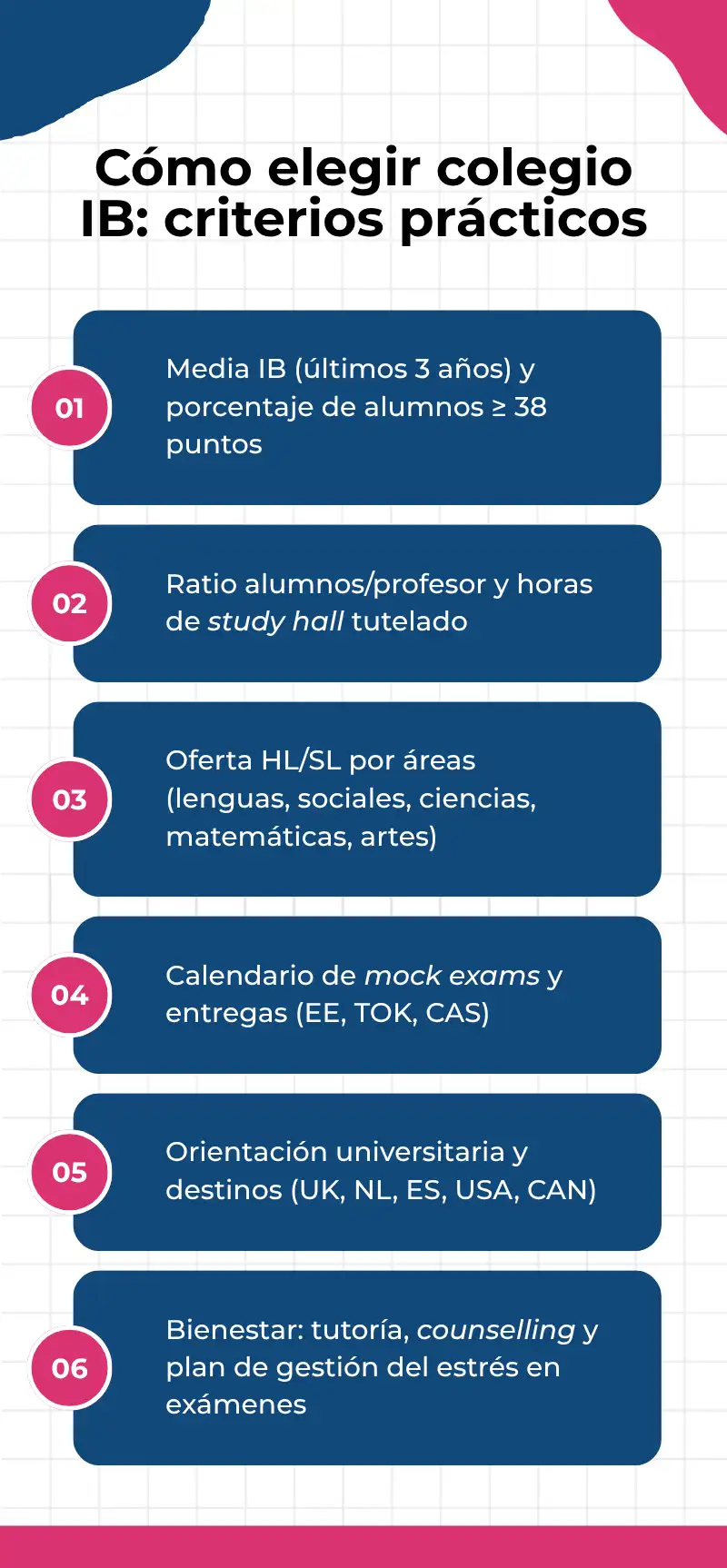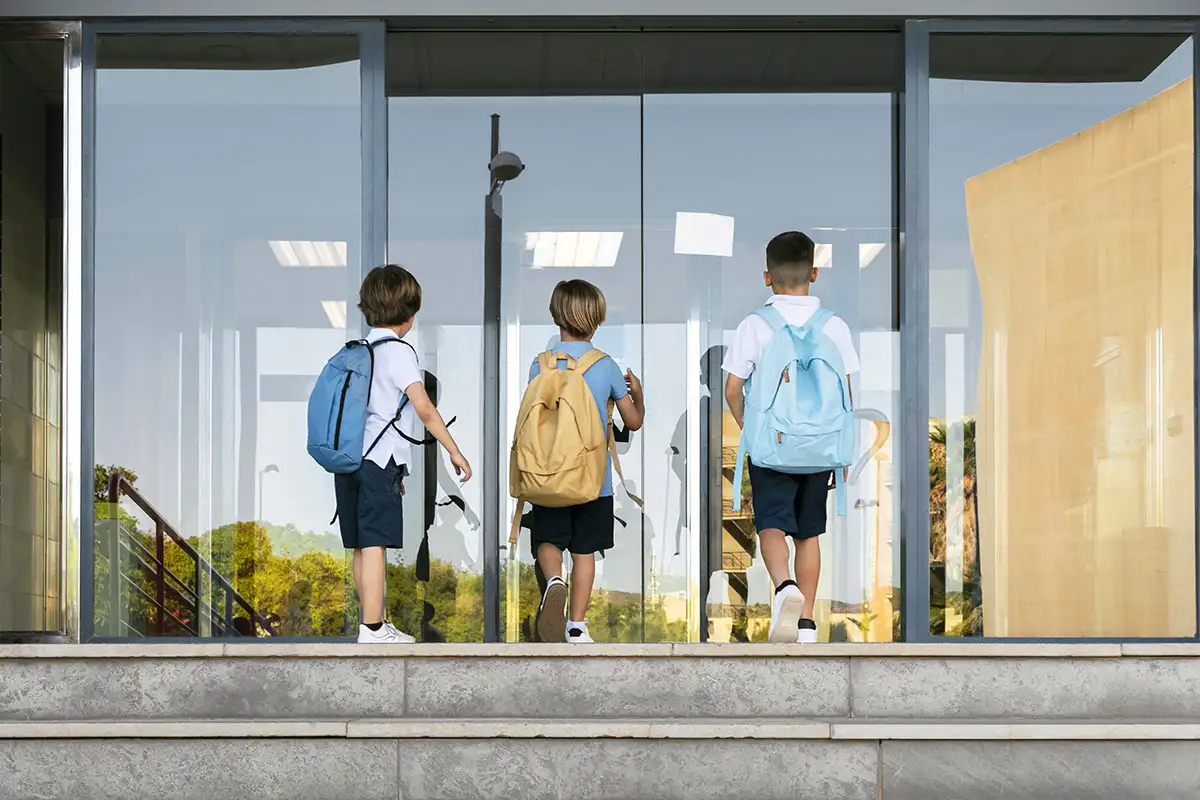In this blog we show you a selection of the best private schools in Spain because choosing a private school to study for the International Baccalaureate (IB) is a decision that influences academic rigor, the acquisition of global competencies and university projection. Within Best Schools in Spain (BSS) The best private schools in Spain with a proven track record, proven results and a strong international focus can be found here. This guide brings together the essentials of IB and a list of the BSS schools that teach it.
What is the International Baccalaureate (IB)?
The IB is a globally recognized educational framework that promotes critical thinking, research and international mindedness. In its final stage, the Diploma Program (PD) -equivalent to 1st and 2nd year of Bachillerato- is structured in six groups of subjects and core components: Theory of Knowledge (TOK), Monography (EE) y Creativity, Activity and Service (CAS).
What IB provides
- Rigor and standardized evaluation recognized by universities worldwide.
- Active learning through projects, essays and oral presentations.
- International profile and development of transversal competencies (communication, research, collaboration).
- Flexibility of itineraries combining levels HL/SL according to academic interests.
How to choose an IB school: practical criteria
- Continuum IB available (PEP, PAI and PD) or, at least, strength in the PD.
- Academic results of the last three years (IB average and distribution of scores).
- LanguagesEnglish and second/third language; certifications.
- Accompanimenttutoring, university orientation and mock exam schedule mock exams.
- HL/SL Offering in all six areas (languages, social studies, science, mathematics, arts).
- Educational environmentLaboratories, arts, music, sports, public speaking and debate.
- Family logisticslocation, transportation, dining room and, if necessary, residence.

The best private schools in Spain with IB offer
Madrid and downtown
SEK International School El Castillo (Madrid) – SEK Group; extensive experience in IB, sports and languages.
Colegio San Patricio Madrid (Madrid) – Academic excellence and solid university orientation.
Mirabal International School (Madrid) – National, International or Integrated Baccalaureate; high performance.
Alameda de Osuna International School (Madrid) – IB, National and Dual; international project.
SEK International School Ciudalcampo (Madrid) – International focus with extensive facilities.
IDEO School (Madrid) – Humanistic project with International Baccalaureate.
Catalonia and Mediterranean
Agora Sant Cugat International School (Barcelona) – Teaches all IB programs.
SEK International School Catalunya (Barcelona) – Authorized for PEP, PAI and PD.
St. Peter’s School (Barcelona) – IB Continuum in English from 3 to 18 years old.
Agora Barcelona International School (Barcelona) – Innovation and high performance.
Oak House School (Barcelona) – International track and IB in higher stages.
Benjamin Franklin International School (Barcelona) – American curriculum with PAI e IBDP.
Agora Lledó International School (Castellón) – Pioneer of IB in the province; excellence and personalized attention.
Mas Camarena Educational Complex – International School (Valencia) – Multilingual and innovative project.
Andalusia, Levante and Murcia
Torrequebrada International School (Málaga) – Multilingual project with an investigative approach.
San José School (Malaga) – Private and bilingual school with Diploma Program.
Agora Granada College International School (Granada) – Bilingual school with IB itineraries.
SEK International School Alborán (Almeria) – SEK Group; international projection.
King’s College, The British School of Murcia (Murcia) – British curriculum with option IB Diploma.
King’s College Alicante (Alicante) – British curriculum with international pathways.
Islands
Brains International School Las Palmas (Canary Islands) – International project, sport and innovation; IB pathways.
Agora Portals International School (Balearic Islands) – Bilingual (Spanish/English) with IB Diploma.
Galicia and north
SEK International School Atlántico (Galicia) – International continuity and IB offer.
Manuel Peleteiro School (Galicia) – Private center of reference with an integral vision.
Los Sauces School (Vigo, Pontevedra, Torrelodones, La Moraleja) – Innovation (Progrentis), public speaking and debate; international and IB tracks according to location.
British School of Aragon (Zaragoza) – Innovative and creative approach with international itineraries.
Other BSS schools have British curriculum (IGCSE, A-Levels) and early international stages – e.g, Hastings School, King’s College La Moraleja, King’s Infant School Chamartín o The English Center-. If the objective is IB Diplomaconfirms that the campus specifically offers the PD in the 1st – 2nd year of Bachillerato.
IB, academic excellence with international projection
The International Baccalaureate combines academic demands, a global mindset and support for personal development. The BSS schools schools that provide it share quality standards and a student-centered educational vision, facilitating a solid transition to higher education both in Spain and abroad.
Frequently Asked Questions
What exactly is the International Baccalaureate (IB)?
The International Baccalaureate (IB) is a globally recognized educational program that fosters critical thinking, research and international mindedness. Its final stage, the Diploma Programme (DP), is equivalent to the 1st and 2nd years of the Baccalaureate and is structured into six subject groups along with three core components: Theory of Knowledge (TOK), Extended Essay (EE) and Creativity, Activity and Service (CAS).
Why choose a private school to study IB in Spain?
IB private schools stand out for their international focus, personalized attention and advanced academic resources. They offer a multilingual environment, continuous university orientation and excellent results, with high admission rates to national and international universities.
Is the IB valid for access to Spanish universities?
Yes, the IB is officially recognized in Spain by means of UNEDasisswhich issues an accreditation for the admission process in Spanish universities. In addition, it allows the weighting of specific subjects to improve the access grade.
What is the difference between the IB and the National Baccalaureate?
The International Baccalaureate offers a more global, flexible and competency-based curriculum, with continuous and globally standardized assessment. The
What level of English is required to take the IB?
Most IB schools in Spain teach a large part of the program in English, so a B2-C1 level is recommended. This allows you to follow the bibliography, write essays and give oral presentations fluently.
What are the advantages of studying IB at a BSS school?
Best Schools in Spain (BSS) combine the academic rigor of the IB with a bilingual environment, educational innovation and personalized guidance. Many offer the full IB Continuum (PEP, PAI and PD) and have an excellent track record of results and university access.
Where are the best IB private schools in Spain?
The IB is present in the main regions: Madrid, Catalonia, Valencia, Andalusia, Galicia and the Balearic Islands. Featured centers include SEK International Schools, Agora Schools, Colegio San Patricio, St. Peter’s School, Colegio Torrequebrada, among others belonging to the BSS network.
IB or A-Levels: what to choose if I want to study abroad?
Both programs open international doors. The IB offers breadth and cross-cutting skills; the A-Levels, specialization in 3-4 subjects. For British or American universities, both are valid; the choice depends on the student’s profile and objectives.



